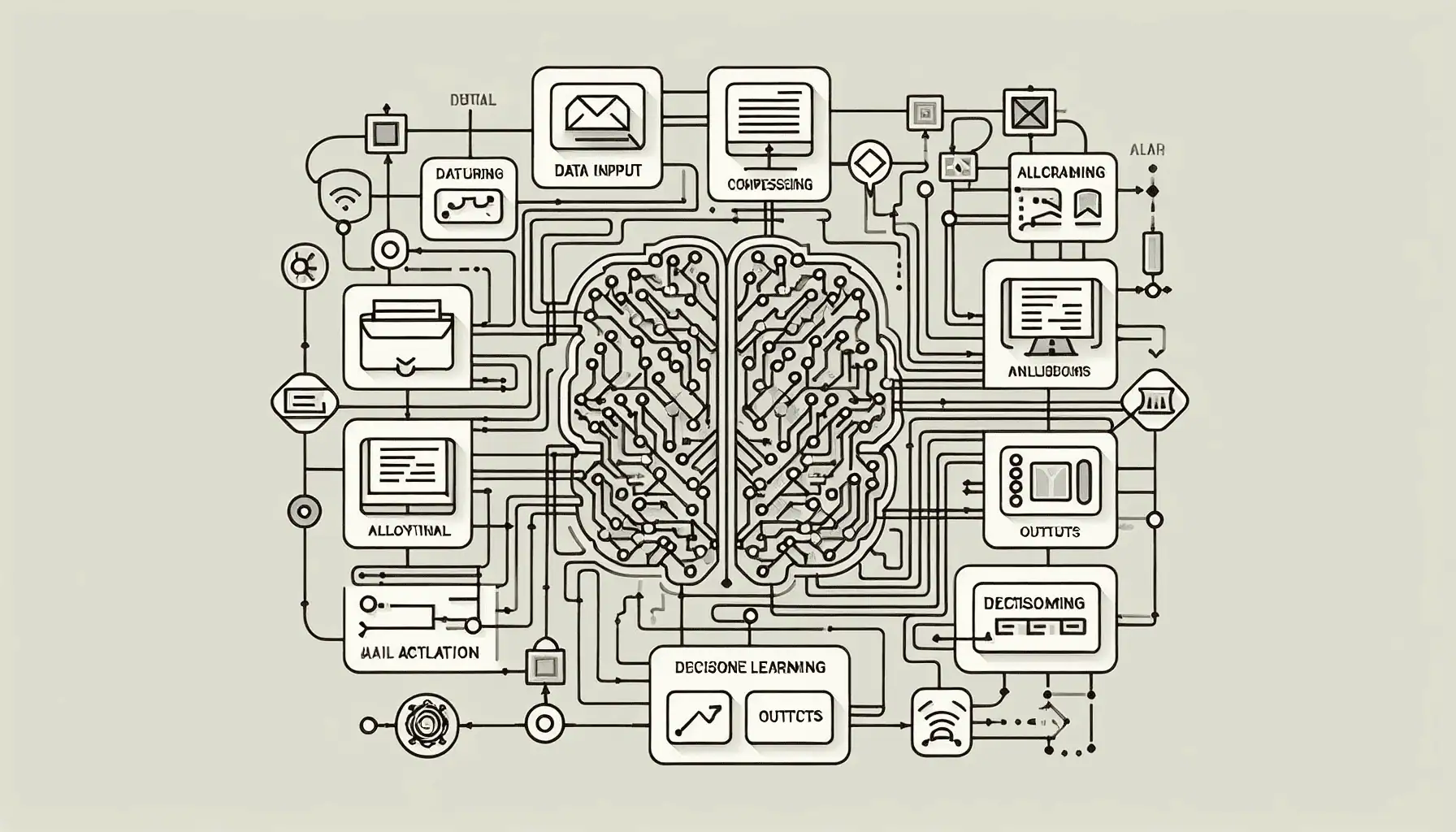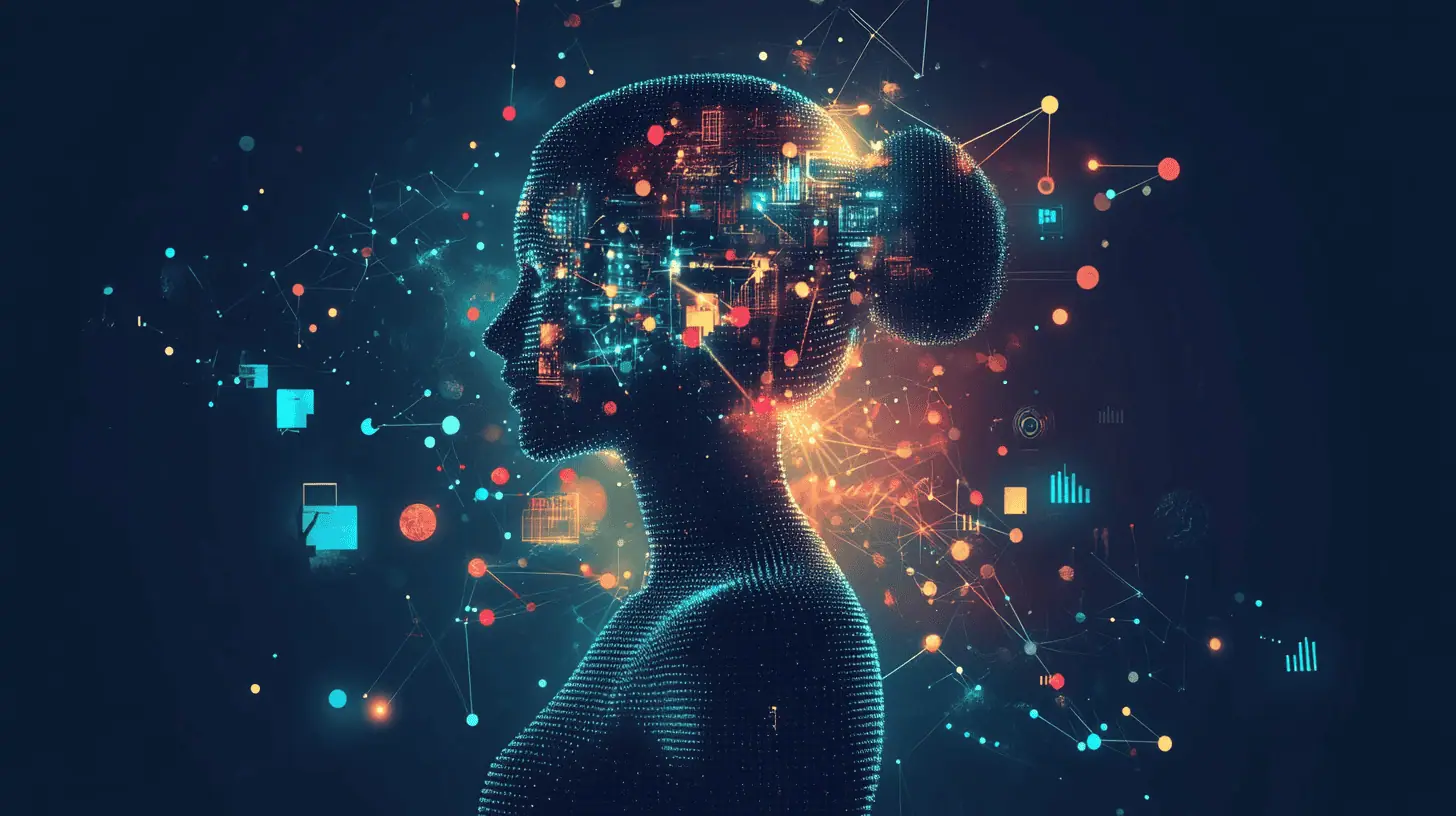
AI Agents: A Comprehensive Guide
Key Takeaways
- Definition: AI agents are sophisticated software programs capable of autonomous decision-making tasks by interacting with and analyzing their surroundings through data inputs and sensor feedback.
- Business Benefits: They significantly enhance productivity, reduce operational costs, support advanced decision-making with data analytics, and improve customer engagement through personalization and responsiveness.
- Operating Mechanism: AI agents simplify complex tasks and leverage state-of-the-art technologies like machine learning and natural language processing for intelligent decision-making.
- Types: AI agents are diverse, including simple reflex, model-based, goal-based, utility-based, learning, and hierarchical agents, each tailored for various applications and industries.
- Challenges: Implementing AI agents poses challenges such as data privacy concerns, ethical considerations, and the need for technical knowledge and resources.
- Evolution: AI agents have evolved from basic, reactive machines to advanced systems such as theory of mind AI, which seeks to interpret complex human emotions.
Introduction
The rapid advancement of Artificial Intelligence (AI) is reshaping the landscape of global industries by enabling smarter, faster, and more efficient operations. AI agents sit at the heart of this technological revolution, fundamentally transforming how we automate processes and make decisions. In this comprehensive guide, we will thoroughly explore the realm of AI agents by examining their definition, benefits, functioning, types, challenges, real-world applications, and evolution.
Understanding AI Agents
Definition and Function
AI agents are specially designed software that interact with their environment to achieve specific tasks or goals assigned by humans. Acting as rational entities, these agents incorporate advanced data collection techniques and are capable of processing various inputs to make informed decisions.
Example:
- Self-driving Cars: By leveraging sensor data and real-time analytics, self-driving cars continuously adapt their navigation strategies, making split-second decisions to ensure safe and efficient travel.
- Smart Home Assistants: Devices like Amazon Echo utilize AI agents to adjust lighting, manage schedules, and even order groceries, providing users with a seamless interaction experience.
Benefits in Business
AI agents bring a suite of advantages that can substantially improve business operations:
Enhanced Productivity: By automating repetitive tasks, AI agents allow employees to focus on more strategic projects, thereby improving overall productivity. For instance, in the logistics industry, AI systems automate warehouse sorting processes, drastically reducing the time required to organize items for shipment.
Cost Reduction: Reducing manual errors and optimizing resource allocation through AI processes lead to significant cost savings. In healthcare, AI-driven diagnostic tools reduce the need for costly second opinions by enhancing the accuracy of initial assessments.
Informed Decision-Making: AI agents analyze massive datasets to provide insights that drive accurate, reliable decision-making. For example, in retail, AI predictive models help determine optimal stock levels, minimizing waste and maximizing sales.
Improved Customer Engagement: Through advanced personalization, AI agents tailor user experiences, such as via chatbots or personalized recommendations, enriching customer interactions and satisfaction.
Case Study: Consider how Netflix uses AI agents to recommend personalized content to millions of users based on past viewing behavior, significantly increasing viewer retention and engagement rates.
Operating Mechanism of AI Agents
Task Simplification
AI agents streamline and automate complex tasks through well-defined workflows:
Data Management: They efficiently handle extensive data sets and manage interactions with applications.
Automation: By following pre-defined rules, AI agents execute tasks, receiving and acting on feedback to improve operations. Supply chain management systems use AI agents to predict demand and optimize inventory levels.
Error Analysis: By identifying and correcting inefficiencies, AI systems continuously evolve, improving overall performance. A predictive text application, for instance, learns from typing errors and refines its suggestions over time.
Decision-Making Processes
AI agents deploy advanced technological systems for effective decision-making:
Measure Performance: They assess actions against success metrics, adjusting strategies to meet objectives.
Understand Environment: By analyzing external conditions, AI agents align their activities with dynamic environments. In agriculture, AI drones monitor crop health and determine optimal harvesting times based on environmental data.
Actuation and Sensing: These agents engage real-time data to make informed decisions. Through machine learning and natural language processing, they perform tasks with precision. In finance, algorithmic trading systems execute trades based on real-time market analysis, optimizing returns.
AI agents’ capacity to learn from experiences ensures that they continually enhance their decision-making capabilities.
Types of AI Agents
Simple Reflex Agents
- Operation: Execute actions based on condition-action rules without memory.
- Example: Basic temperature control systems use pre-set thresholds to maintain room temperature.
Model-Based Reflex Agents
- Operation: Utilize an internal state and condition-action rules for decision-making.
- Example: Automated vacuum cleaners adjust cleaning paths based on furniture layout memory.
Goal-Based Agents
- Operation: Plan actions to achieve specific goals using planning algorithms.
- Example: Navigation systems use algorithms to optimize route planning for timely arrivals.
Utility-Based Agents
- Operation: Assess and choose solutions based on a utility function to maximize performance.
- Example: Financial advisors leverage utility-based agents to create portfolios that balance risk and return optimally.
Learning Agents
- Operation: Dynamic memory allows learning from experiences, continually improving task performance.
- Example: Music streaming services use AI to evolve playlists by learning user preferences and incorporating feedback.
Hierarchical Agents
- Operation: Employ task decomposition for structured decision-making.
- Example: Autonomous robots execute missions by breaking down job sequences into manageable tasks.
Choosing the right AI agent type depends heavily on the specific tasks and application needs within an industry.
Challenges and Considerations
Data Privacy
The reliance on extensive data processing raises inherent privacy concerns. To address these:
- Data Encryption: Implement encryption to protect data during transmission.
- Anonymization: Anonymize data to preserve user identities and comply with privacy regulations.
- Minimization Policies: Limit data collected to the minimum necessary to complete tasks effectively.
Ethical Concerns
Ethical considerations around AI-agent decision-making must prioritize:
- Bias-free Algorithms: Regularly audit algorithms to ensure they are free of bias and do not reinforce negative stereotypes.
- Accountability and Transparency: Develop systems where decisions can be traced back to a human or a clearly defined process.
Technical Complexity
Developing, implementing, and maintaining AI systems necessitates:
- High Computational Resources: Access to advanced computational infrastructure is critical for running complex AI models efficiently.
- Skilled Expertise: Expertise in AI technologies is essential to design and maintain effective AI systems. Companies may need to invest in workforce training or hire specialists to bridge knowledge gaps.
Real-World Applications of AI Agents
Customer Service
AI agents revolutionize customer service by providing:
- 24/7 Support: Chatbots offer instant, round-the-clock customer service, handling queries outside of regular business hours.
- Personalized Responses: They tailor interactions based on customer data to enhance user satisfaction and loyalty.
Fraud Detection
AI agents safeguard the financial sector with:
- Pattern Recognition: Systems detect irregular patterns and flag potentially fraudulent activities, reducing financial risks.
- Real-Time Risk Assessment: By evaluating transaction data, AI models assess risk levels instantly, allowing for preventative measures.
Predictive Maintenance
Manufacturing industries benefit immensely from AI agents by:
- Proactive Equipment Monitoring: AI agents predict machinery failures by analyzing operational data, preventing costly downtime.
- Process Optimization: They continually refine manufacturing processes, enhancing efficiency and output quality.
Healthcare
AI agents transform healthcare delivery:
- Diagnostic Accuracy: AI systems analyze medical data more accurately than humans alone, reducing diagnostic errors.
- Patient Management: Virtual nursing assistants monitor patient conditions and provide timely interventions, improving care delivery.
Evolution of AI Agents
Reactive Machines
Debut AI systems responded in real-time without the capacity for learning, like IBM's Deep Blue, which defeated world chess champion Garry Kasparov by evaluating potential moves quickly and effectively.
Limited Memory Machines
Evolving to learn from limited past data, such as autonomous vehicles’ use of traffic patterns to optimize route choices, they offer better long-term decision-making.
Theory of Mind AI
This emerging class aims to understand and interact with humans through cognitive and emotional understanding, aspiring toward enhanced human-like interactions in environments such as conversational AI companions.
The progression from simple reactive agents to sophisticated emotional understanding marks a significant leap in AI capacities, enabling more nuanced and effective solutions across industries.
Conclusion
AI agents are integral to the ongoing digital transformation across various sectors by providing unparalleled insights and automating elaborate processes. As these technologies continue to advance, organizations that embrace and strategically implement AI agents are poised to achieve substantial competitive advantages and drive innovative solutions. To remain forward-thinking, businesses should actively explore AI adoption as a pivotal component in evolving the digital landscape and securing success in an increasingly tech-centric world.
By understanding these nuances, businesses can better harness AI's power to navigate challenges and capitalize on emerging opportunities.
Let AI Revolutionize Your Business
Ready to find out how AI agents and automation can transform your operations? Schedule a discovery call today and learn how our tailored solutions can save you time, boost efficiency, and help your business grow.

















